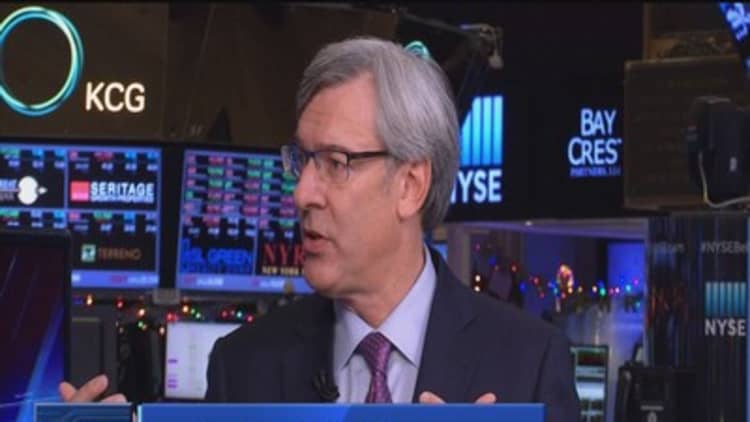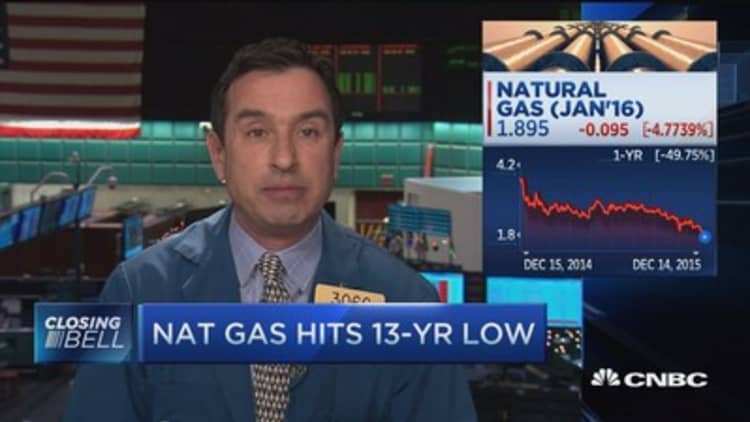
Crude oil rebounded Monday afternoon after dipping below $35 a barrel for the first time since 2009, a concerning statistic for those in Canada, where thousands of oil-related jobs have already been lost.
In fact, oil comprises about 10 percent of the country's gross domestic product and as of two years ago, oil industry jobs made up 87 percent of all jobs.
However, Dave McKay, president and CEO of the Royal Bank of Canada, told CNBC's "Closing Bell" that all hope is not lost.
"Certainly it impacts the Alberta economy and the Saskatchewan economy, but we're seeing quite a bit of strength in Ontario, Quebec and British Columbia," he said Monday. "Next year we expect GDP outside of Alberta to be roughly 2.5 percent and nationally around 2 percent."
McKay cited Canada's ability to export to the U.S. marketplace and the fact that more Canadians are shopping at home and traveling less to the United States as signs of support in the Canadian economy.
Regardless, McKay admitted that job loss and retail portfolios could deteriorate in Alberta and Saskatchewan. However, he added that the Royal Bank's credit portfolio is very strong and that the bank stress tests significantly.
"If you looked at our Q4 numbers ... our credit book is very strong. Our gross impaired loans declined year over year, so the consumer is still healthy nationally," he said.
In response to the weakness in some of Canada's provinces, Prime Minister Justin Trudeau said he plans to increase government spending to ease the problems caused by falling crude oil prices.
McKay said this could be good news for job creation.
"Certainly [the government is] reviewing their spending patterns but they've made a commitment to invest in infrastructure and as you know that creates jobs and long-term sustainability," McKay said. "So I think it's a good thing for the economy broadly across Canada in the long term."
The U.S. Economy
RBC recently acquired City National and McKay said strong employment growth in the U.S. could be a point of strength for the bank.
"We don't think the announced reductions in the oil and gas industry are meaningful. There's only 180,000 jobs in the oil and gas industry in America," he said. "So we're seeing strong job growth, we're seeing consumer spending, we're seeing broad-based strength that we are very excited about."

On the other hand, one negative issue plaguing the U.S. economy is the unseasonably warm weather in parts of the Northeast, where natural gas is generally used. In fact, natural gas hit a 13-year low on Monday.
"When I see ... a weather pattern like that, I'm looking for rallies to sell at least for the next two or three weeks," Anthony Grisanti of GRZ Energy told CNBC's "Closing Bell." "If the weather patterns don't change, you have to sell rallies.
Grisanti said there's no demand for natural gas right now, putting it at nearly $1.90, equivalent to approximately $20 per barrel of crude oil.
"We are at the bottom levels of this right now, and I don't even know how companies are holding on at this point," he said. "[A bottom] could be $1.75, it could be $1.50. Those are numbers that are being thrown around on the trading floor all day today."
Not only was natural gas struggling on Monday but oil flirted with 11-year lows, as well.
"I don't think anybody thought that oil prices would be trading below a $35 handle at this time of year," said Grisanti. "I think most players thought that we would have some sort of bounce back at this point."
So what's an investor to do?
"If a trader has a position on right now and they have held it all this long, you have to keep holding it at this point because, you know, the downside could only be $2 or $3 lower from here ... this bond situation is very serious for the oil market," he said.




